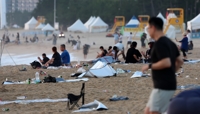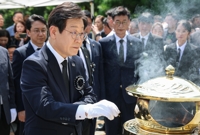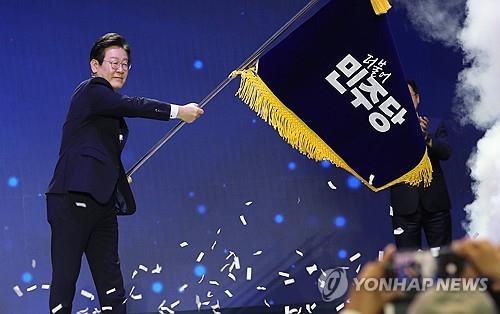(News Focus) Deepening Russia-N.K. ties reignite debate over S. Korea's nuclear options
By Kim Seung-yeon
SEOUL, June 26 (Yonhap) -- The deepening relations between Russia and North Korea, amplified by their new treaty pledging stronger military ties, is refueling the debate over whether South Korea should have its own nuclear programs.
The call has gained traction after a recent report by the Institute for National Security Strategy (INSS) called for diversifying options in response to North Korean threats, including redeploying U.S. tactical nuclear weapons to the Korean Peninsula, having potential nuclear capabilities or building its own nuclear weapons.
The state think tank's report came after Russian President Vladimir Putin and North Korean leader Kim Jong-un announced their "comprehensive strategic partnership" treaty after talks in Pyongyang. The treaty provides for mutual military assistance in the event of an armed attack on either of them.
Experts have said the treaty could be tantamount to Moscow accepting the North as a nuclear state.
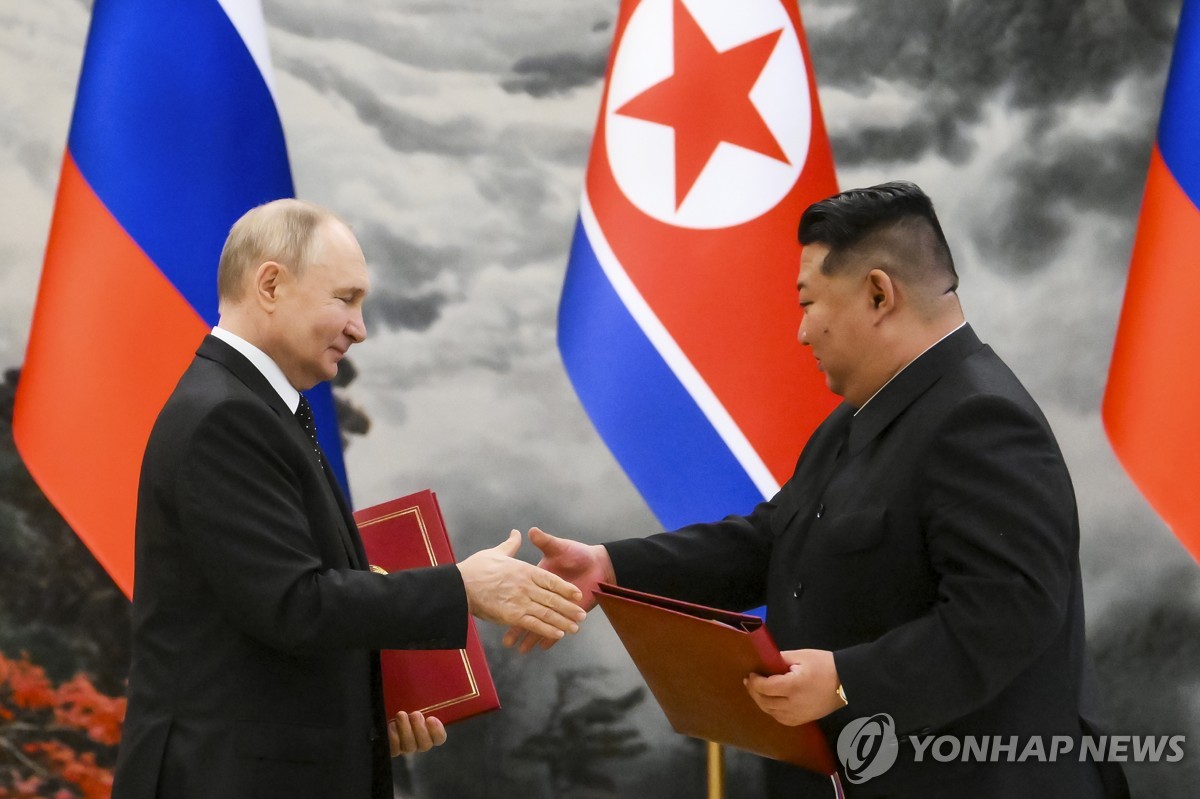
This photo, published by the Associated Press, shows Russian President Vladimir Putin (L) and North Korean leader Kim Jong-un exchanging documents during a signing ceremony of the new partnership in Pyongyang, North Korea, on June 19, 2024. (Pool photo) (Yonhap)
Tactical nuclear arms refer to battlefield weapons with relatively lower yields, compared with relatively higher yield "strategic" weapons usually carried by longer-range delivery vehicles, such as ICBMs, submarine-launched ballistic missiles or long-range bombers.
U.S. tactical nuclear weapons were withdrawn from the Korean Peninsula in 1991. South Korea has since adhered to its non-nuclear status while relying on America's "extended deterrence" commitment to defend the Asian ally by using all means, including nuclear weapons.
The argument for South Korea to go nuclear, or to consider bringing back U.S. tactical nuclear weapons and other options is not new, but the expanding relations between Pyongyang and Moscow have given rise to voices across the board.
Rep. Na Kyung-won, a five-term lawmaker of the ruling People Power Party now running for party leader, said Wednesday she will adopt nuclear armament as an official party policy initiative if she wins.
"The history of the international community shows that only countries with the power to suppress external threats have survived. This is why we must keep all doors open and consider nuclear armament now," she said, adding that she will do so by consulting with the United States.
Former PPP leader Han Dong-hoon, a leading candidate in the race for party leader, also called for building potential capabilities to arm the country with nuclear weapons whenever it is necessary, noting limitations in relying on the U.S. for security.
"We should move at least to the point of equipping ourselves with potential capabilities to go nuclear whenever we decide to do so, just like Japan is now," Han said. "The global security situation is constantly changing, so there are limitations to relying solely on our allies."
Daegu Mayor Hong Joon-pyo, a hard-line conservative known for his blunt comments, went a step further by calling for South Korea even to withdraw from the Non-Proliferation Treaty (NPT) in order to develop nuclear weapons.
"Can the United States defend Seoul while risking New York turning into a sea of fire?" Hong wrote in a Facebook post, borrowing the quote of former French President Charles de Gaulle when France pulled out of NATO to make nuclear weapons.
"Now is the time that we show our determination like de Gaulle's," Hong said.

This AFP photo shows Vipin Narang (L), principal U.S. deputy assistant secretary of defense for space policy, and Cho Chang-rae, South Korea's deputy defense minister for policy, attending a press conference following the third meeting of the Nuclear Consultative Group (NCG) at the Ministry of National Defence in Seoul on June 10, 2024. (Pool photo) (Yonhap)
The INSS said the part of the Kim-Putin treaty pledging cooperation in the "peaceful use of nuclear power" can be seen as Moscow recognizing Pyongyang as a nuclear state, given the precedent of the 2008 treaty between the United States and India.
Allison Hooker, former senior White House National Security Council director for Asia under the Donald Trump administration, said the deepening military relationship between the North and Russia may be pushing South Korea to consider seeking its own nuclear program.
"I think we cannot rule out the fact that South Korea continues to move, maybe more rapidly, towards its own nuclear program," she said at a webinar last week.
However, those who strike a cautious note say South Korea should make the most of the U.S. nuclear umbrella, based on the Washington Declaration issued at last year's April summit of President Yoon Suk Yeol and U.S. President Joe Biden.
The declaration paved the way for the allies to establish the bilateral Nuclear Consultative Group (NCG) to discuss strategic and nuclear planning issues as a framework for the U.S. "extended deterrence" commitment.
"We need to boost our nuclear deterrence against North Korean threats by ensuring the effectiveness of the declaration," Won Hee-ryong, a former land minister also running for the ruling party's leadership race, said in a social media post.
It was also echoed in the comments of U.S. Deputy Secretary of State Kurt Campbell, who pointed to the importance of following through with the steps in the declaration.
"I think that the mechanisms that we've put in place ... the Washington Declaration and the strategic initiatives that have been launched to underscore the added signification of American extended deterrence, particularly in situations like Korea, I think it's given us what we need to work with now," he said during a forum hosted by the Council on Foreign Relations.
Rep. Yoon Sang-hyun of the PPP, another contender for party leader, called Wednesday for a nuclear sharing agreement with the U.S., saying it would be "more realistic" to the extent that South Korea sticks to the denuclearization policy.
The South Korean government stressed efforts to strengthen extended deterrence cooperation with Washington and its full compliance with NPT obligations.
"South Korea and the United States are closely consulting through the NGC to faithfully implement the historic Washington Declaration between the two leaders," foreign ministry spokesperson Lim Soo-suk said.
"Through these efforts, we are enhancing the alliance's deterrence and response capabilities against the escalating North Korean nuclear threats," Lim said.
The main opposition Democratic Party, which has a controlling majority in the National Assembly, rejected calls for nuclear armament as "irresponsible and highly dangerous," saying going nuclear would entail international sanctions that would deal a blow to South Korea's export-dependent economy.
"Some may argue for it, but it is an unattainable card," Rep. Jung Chung-rae, a member of the DP's Supreme Council, said. "If we pull out of the NPT and go ahead with nuclear weapons development, U.S. economic retaliation will follow. How then would South Korea's foreign-dependent economy end up?"

A nuclear-capable U.S. B-52 strategic bomber takes part in a combined air exercise with South Korean and Japanese fighter jets over waters southeast of Jeju Island on April 2, 2024, in this file photo provided by the defense ministry. (PHOTO NOT FOR SALE) (Yonhap)
[email protected]
(END)
-
 Do Ho Suh reimagines father's ink paintings on LG's transparent OLED screens
Do Ho Suh reimagines father's ink paintings on LG's transparent OLED screens -
 N. Korea slams Kishida's call for nuclear-free world
N. Korea slams Kishida's call for nuclear-free world -
 Gov't to secure additional COVID-19 treatments this month: presidential office
Gov't to secure additional COVID-19 treatments this month: presidential office -
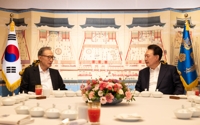 Yoon hosts dinner for former President Lee Myung-bak
Yoon hosts dinner for former President Lee Myung-bak -
 (URGENT) 172,000 jobs added on-year in July: data
(URGENT) 172,000 jobs added on-year in July: data
-
 Do Ho Suh reimagines father's ink paintings on LG's transparent OLED screens
Do Ho Suh reimagines father's ink paintings on LG's transparent OLED screens -
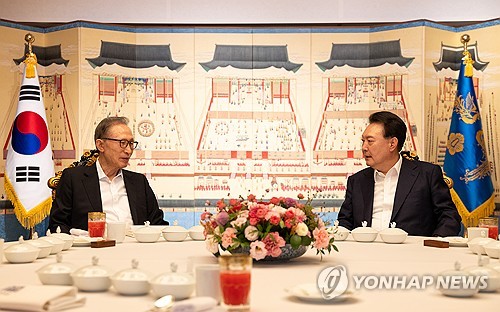 Yoon hosts dinner for former President Lee Myung-bak
Yoon hosts dinner for former President Lee Myung-bak -
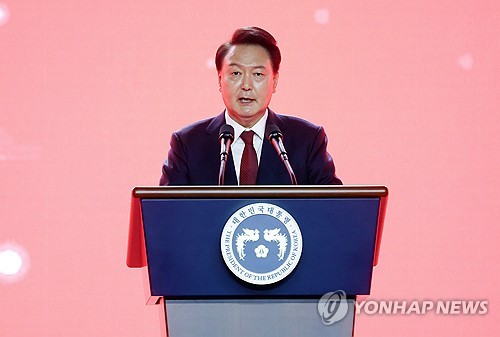 Yoon voices frustration over 'national foundation day' controversy
Yoon voices frustration over 'national foundation day' controversy -
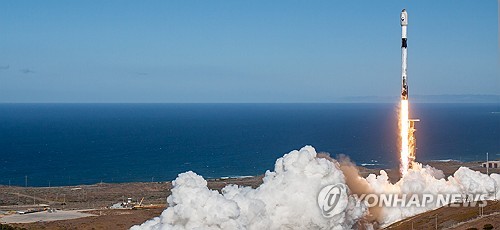 S. Korea's 1st spy satellite approved for combat suitability
S. Korea's 1st spy satellite approved for combat suitability -
 N. Korean leader exchanges message with Putin on 79th anniv. of Korea's liberation from Japan's colonial rule
N. Korean leader exchanges message with Putin on 79th anniv. of Korea's liberation from Japan's colonial rule
-
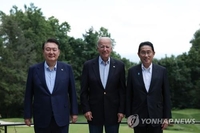 (LEAD) Leaders of S. Korea, U.S., Japan reaffirm commitment to trilateral security cooperation
(LEAD) Leaders of S. Korea, U.S., Japan reaffirm commitment to trilateral security cooperation -
 Media watchdog to review punitive measures against KBS for airing Japanese anthem on Liberation Day
Media watchdog to review punitive measures against KBS for airing Japanese anthem on Liberation Day -
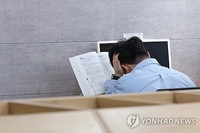 Number of economically inactive youth by choice hits fresh high in July
Number of economically inactive youth by choice hits fresh high in July -
 Traces of COVID-19 virus surge in wastewater amid summer wave
Traces of COVID-19 virus surge in wastewater amid summer wave -
 Weather agency to publish white paper on heat waves for 1st time
Weather agency to publish white paper on heat waves for 1st time



